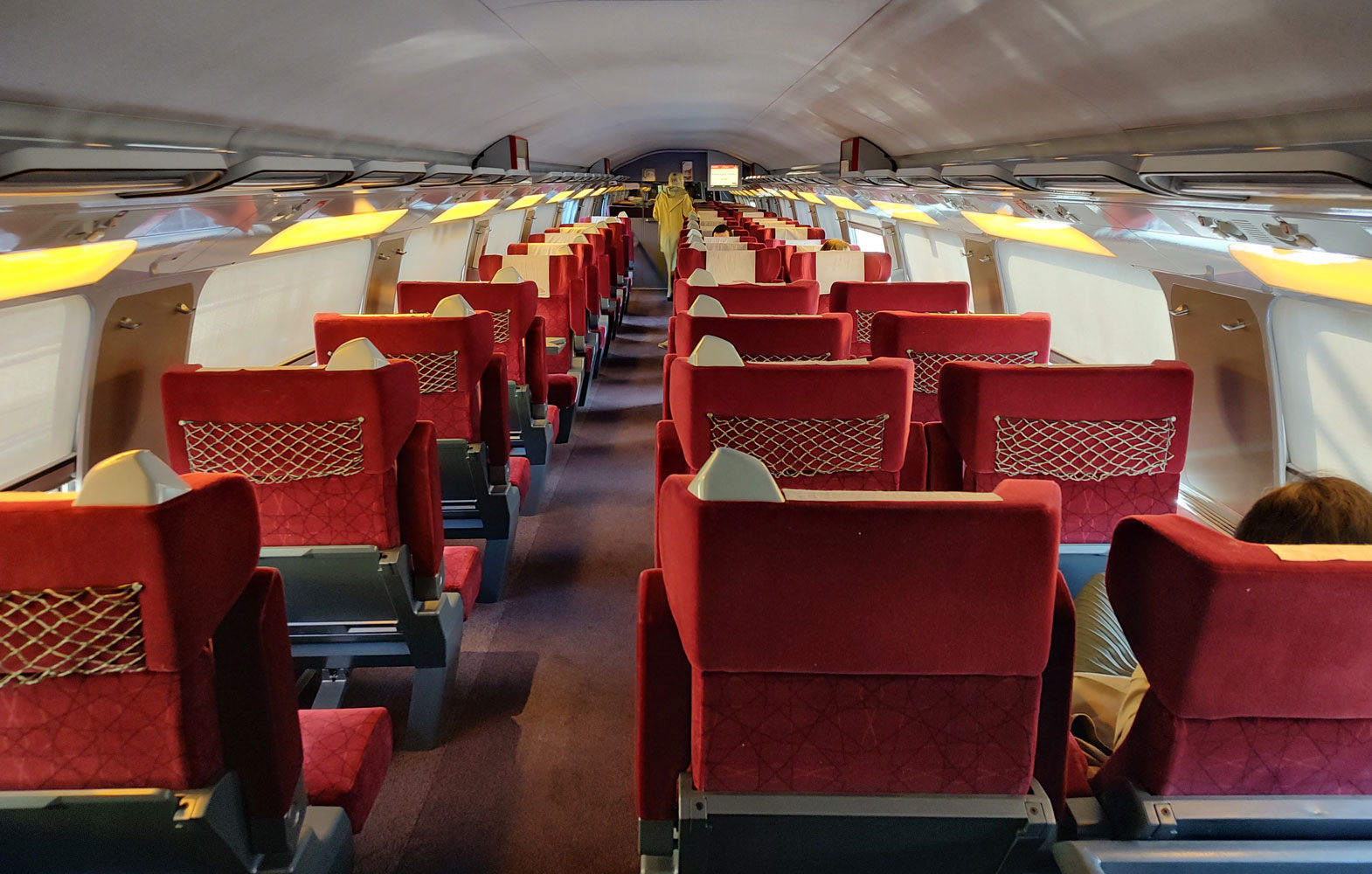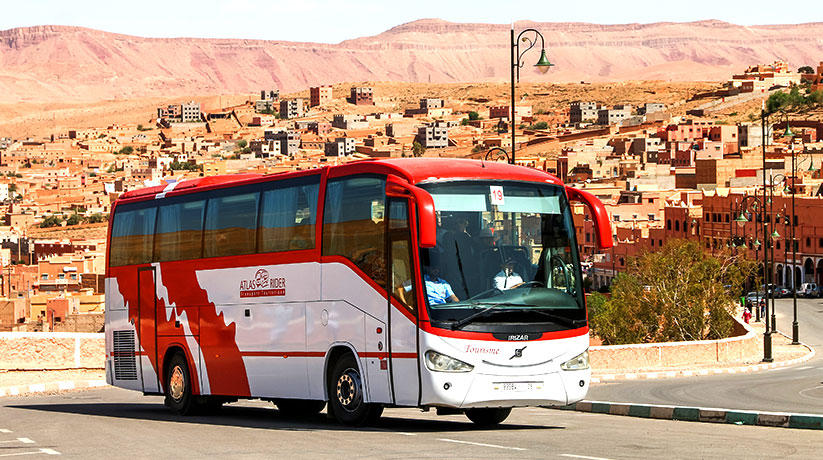
Morocco offers a fascinating blend of ancient cities, stunning coastlines, and dramatic desert landscapes. When planning your travels between these diverse regions, a key decision you’ll face is whether to take the bus or the train. Both offer unique advantages and disadvantages, catering to different travel styles, budgets, and destinations.
Let’s break down the pros and cons of bus and train travel in Morocco to help you make the best choice for your adventure.
1. Route Coverage: Where Can They Take You?
This is often the most significant factor in your decision.
- Trains (ONCF): Morocco’s train network, operated by ONCF (Office National des Chemins de Fer), is excellent but limited to the major cities in the north and central regions.
- Main Routes: Tangier, Rabat, Casablanca, Fes, Meknes, and Marrakech are well-connected by train.
- High-Speed (Al Boraq): The impressive Al Boraq high-speed line connects Tangier and Casablanca in just over 2 hours, with stops in Kenitra and Rabat.
- Limitations: The train network does not extend to popular tourist destinations like Agadir, Essaouira, Chefchaouen, Ouarzazate, or the Sahara Desert regions (e.g., Merzouga, Zagora). For these, buses are your only public transport option.
- Buses (CTM & Supratours): Buses, particularly those operated by the reputable companies CTM (Compagnie de Transports au Maroc) and Supratours, offer a far more extensive network, reaching virtually every town and city in Morocco.
- Comprehensive Coverage: You can get to coastal towns like Agadir and Essaouira, mountain gems like Chefchaouen, and desert gateways like Ouarzazate and Merzouga directly by bus.
- Flexibility: With more routes and generally more frequent departures, buses often provide greater flexibility for reaching specific, off-the-beaten-path destinations.
Verdict on Routes: If your itinerary sticks to the major imperial cities and the Tangier-Casablanca corridor, trains are a fantastic option. For anything outside this core network, buses are indispensable.
2. Comfort: Which Ride is Smoother?
- Trains: Generally, trains offer a more comfortable and spacious journey, especially if you opt for First Class.
- Seating: First-class carriages offer assigned, wider, and more comfortable seats, often with power outlets. Second class also provides decent seating, though it can be more crowded.
- Movement: Trains offer a smoother ride, allowing you to walk around, stretch your legs, and visit the dining car (on some routes). You’re also less susceptible to motion sickness than on winding bus routes.
- Amenities: Toilets are available on trains, though their cleanliness can vary.
- Views: Large windows provide excellent opportunities for enjoying the scenery.

- Buses: CTM and Supratours operate modern, air-conditioned coaches that are generally quite comfortable for Moroccan standards.
- Seating: Seats are typically comfortable, but legroom can be tighter than on trains, especially for taller individuals.
- Movement: While generally smooth on main highways, bus journeys can be bumpier on less-maintained roads or winding mountain passes.
- Amenities: Buses usually have one or two rest stops on longer journeys for toilet breaks and refreshments. On-board toilets are rare.
- Local Buses: Be wary of much cheaper, local bus companies at the main “Gare Routière” in smaller towns. While very cheap, their comfort levels, punctuality, and safety standards can be significantly lower than CTM or Supratours.

Verdict on Comfort: For maximum comfort and the ability to move freely, trains (especially 1st class) win. However, CTM and Supratours buses offer a perfectly comfortable and often air-conditioned experience.
3. Cost: How Much Will You Spend?
- Buses: Generally, bus tickets are slightly cheaper than train tickets for comparable distances.
- Pricing: A bus ticket on CTM or Supratours is a very economical way to travel long distances in Morocco. Remember to factor in the small additional fee for checked luggage (usually MAD 5-10 per bag).
- Budget-Friendly: If you’re on a tight budget, buses will help your dirhams go further.
- Trains: Train fares are still very affordable by international standards, but typically a bit more expensive than buses.
- First Class vs. Second Class: First-class tickets are pricier but guarantee a seat, more space, and a less crowded environment. Second-class tickets are cheaper and offer good value, but seats are not always assigned on classic trains, meaning you might have to stand during peak times.
- Al Boraq: The high-speed Al Boraq tickets are more expensive than classic train tickets but offer significant time savings.
Verdict on Cost: Buses are generally the most budget-friendly public transport option in Morocco.
4. Speed & Punctuality: Who Gets You There Faster?

- Trains:
- Al Boraq: The high-speed train is by far the fastest way to travel between Tangier, Kenitra, Rabat, and Casablanca.
- Classic Trains: For other major city connections (e.g., Marrakech to Fes), trains are generally faster and more punctual than buses because they avoid road traffic and city congestion.
- Delays: While generally reliable, train delays can still occur, especially on older lines.
- Buses:
- Variability: Bus travel times can be more variable due to traffic, road conditions, and occasional unscheduled stops.
- Longer Journeys: On longer routes, overall journey times might be a bit longer than comparable train routes, especially if the train is high-speed.
- Overnight Buses: For very long distances, overnight buses can save you a day of travel and accommodation costs, but they might not be as comfortable as a sleeper train (which Morocco doesn’t widely offer).
Verdict on Speed & Punctuality: For the fastest and generally most punctual journey between major cities on the rail network, trains have an edge.
5. Convenience & Stations: Getting On and Off
- Trains:
- Modern Stations: Moroccan train stations are often modern, well-maintained, and equipped with amenities like cafes and restrooms.
- Central Locations: Train stations in major cities are usually quite centrally located or well-connected by petit taxi to the city center.
- Online Booking: ONCF’s website allows for convenient online booking.
- Buses:
- Dedicated Stations: Major bus companies like CTM often have their own dedicated stations, which can sometimes be outside the very heart of the city (e.g., in Marrakech, Fes).
- Main Bus Stations (Gare Routière): The general public bus stations (Gare Routière) can sometimes be chaotic, bustling, and less comfortable than train stations, especially in smaller towns.
- Luggage Handling: You’ll need to pay a small fee and ensure your luggage is loaded onto the bus.

Verdict on Convenience: Train stations often offer a more streamlined and comfortable experience, particularly for arrivals and departures in large cities.
The Bottom Line: Choose Based on Your Route
- Choose the Train if:
- You are traveling between Tangier, Rabat, Casablanca, Meknes, Fes, and Marrakech.
- You prioritize comfort, space, and a smoother ride.
- You want to travel faster (especially on the Al Boraq line).
- You appreciate modern, often central stations.
- Choose the Bus if:
- You are traveling to destinations not covered by the train network (e.g., Agadir, Essaouira, Chefchaouen, Ouarzazate, Sahara towns).
- You are on a tighter budget.
- You prefer a more direct route without transfers (to non-train destinations).
- You are comfortable with a slightly more rugged, authentic travel experience.
Many travelers combine both modes of transport, taking the train for core routes and then switching to a CTM or Supratours bus to reach other destinations. Whichever you choose, public transport in Morocco offers an accessible and engaging way to explore this incredible country.
Before you travel, always check the latest schedules and book tickets in advance, especially during peak season or for popular routes, via the official CTM (ctmtickets.com) and ONCF (oncftickets.com) websites.